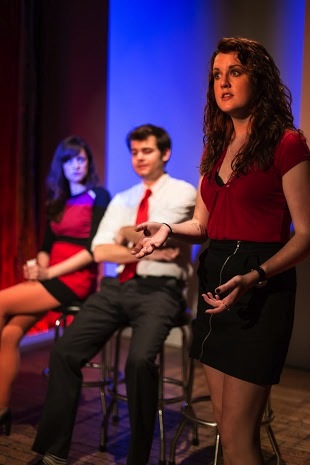Theater Review: Boston Theater Company’s “Romeo & Juliet” — A Romance Rife With Political Scandal
BTC’s experiment, while not without its faults, proffers an admirable model of the sort of creative thinking that more companies should emulate when placing Shakespearean drama in a contemporary American context.
Romeo & Juliet by William Shakespeare. Adapted and directed by Joey Frangieh. Presented by Boston Theater Company at Club Café, Boston, MA, through November 2.

Marge Dunn (Juliet) and Alex Marz (Romeo) in the Boston Theater Company production of “Romeo & Juliet.” Photo: Nile Hawver.
By Ian Thal
The Boston Theater Company is a new troupe of young artists “dedicated,” as they say in their press release, “to preserving the messages and historical language of classical scripts while approaching them in a contemporary way.” Their first production, a presentation of Romeo & Juliet currently running at Club Café in Back Bay indicates how they understand this mission.
As noted a couple of weeks ago in my review of Actors’ Shakespeare Project’s production currently running at the Strand Theatre in Dorchester, MA, Romeo & Juliet is not merely one of the most popular plays in the English language, but one that particularly tempts directors tempted to juice up the Bard with contemporary significance. In this case, quite in contrast to ASP’s generally straight-ahead approach, BTC has chosen to radically reimagine the conflict between Capulet and Montague in renaissance Verona. In this production, the battle is between Democrats and Republicans in today’s America.
There are risks when Shakespeare is “reimagined”: it may seem simple to change the race or gender of a central character, but ultimately, the reinvention must tell a coherent story and work with Shakespeare’s language.
Director Joey Frangieh, who also wrote the adaptation, has compressed the original text down to a ninety minute run time. By comparison, ASP’s staging clocks in at about two hours and fifteen minutes, and the uncut text can easily run just over three hours. Frangieh manages this streamlining by cleverly compacting the plot, cutting characters, combining characters, and occasionally compositing scenes. The result is not Shakespeare’s play but a remix. Given that understanding, it is largely successful: those with a good memory for the original will be fascinated to see and hear how familiar lines function when re-contextualized. They will also be intrigued by what made the cut and what did not.
In BTC’s production, Juliet Capulet (Marge Dunn) is no longer an adolescent being groomed for an arranged marriage, but a Democratic candidate for high office. What office she would run for is left unspecified. A clue: there is a campaign poster featuring her face with the caption of “PROMISE,” a strong visual echo of Shepard Fairey’s 2008 “HOPE” poster for the Obama campaign. (The “PROMISE” poster is among many materials graphic designer Maggie Emerson has created for the play.) Nurse (Caitlin Partridge) and Tybalt (Leilani Ricardo) are no longer a servant and cousin, as they are in the original, but political operatives working on the Capulet campaign.
Romeo (Alex Marz), Benvolio (Amanda Hurley) and Mercutio (Ellen Bryan) are identified as Republicans, though their precise role in party politics is unclear. When they crash a Capulet campaign event, Tybalt and Nurse recognize Romeo, but it is unclear whether he is an office holder, a well-known campaign operative, or the son of a prominent politician. At first, the portrait of the Republicans is that of youthful party operatives partying down in between their adrenaline fueled hours at the headquarters. They are played in a stylized comic manner that recalls the antics of Shakespeare’s Italian contemporaries, the touring commedia dell’arte troupes.
The Democrats by contrast are more disciplined. As played by Dunn, Juliet’s intemperate passion for Romeo is less that of a naïve adolescent than a politician so committed to her cause and career that it has been years since she has allowed anyone pierce the armor of her public persona. Ricardo’s Tybalt (who is given many lines normally spoken by Paris and Lord and Lady Capulet) is less a hothead than a tough chief-of-staff whose fear is that Juliet’s involvement with Romeo will jeopardize everything they have worked for. The Nurse is an aide who is more concerned with the candidate’s emotional well-being; she is satisfied once Romeo assures her that he is not a threat to the Capulet campaign.
When Romeo is sent away to Mantua, it is not for killing anyone, but for drug rehab. What we get is not the story of “two households, alike in dignitie” seen through the lens of an extreme political partisanship that harms the well-being of the Republic. Instead of mirroring the recent government shutdown and the harsh rhetoric that led up to it, BTC is dramatizing scandals amongst the political class. The theme is timely, given that the off-off-Broadway company Access Theatre will be premiering The Weiner Monologues, a play created from the found texts associated with the Weiner texting scandal, or Bruce Norris’ new play Domesticated, which deals with the theme of male politicians, their infidelities, and the public persona of the wives who must stand by their side once their mates’ infidelities become a media spectacle. The result, at least in this Romeo & Juliet, is less political fisticuffs than a personal drama where the characters just happen to be in politics.
Of course, with the rise of the Tea Party movement, it is hard to see our current political debacle a matter of “two households, alike in dignitie” — certainly not to the mostly liberal Boston theater-goers. And most certainly not to the conservatives who flock to the “Shakespeare and the Law” symposiums that Commonwealth Shakespeare Company co-sponsors with the local branch of the Federalist Society (at the latter’s most recent event, more than one panelist compared President Obama to Richard II, while one only stopped a hair short of calling for a coup d’etat.)
The choice to focus on the theme of scandal means shying away from those few scenes in Shakespeare’s original text that have some political resonance today. Gone is Romeo’s dealings with the Apothecary, which prefigure the song “What Keeps Mankind Alive?”in Brecht & Weill’s Threepenny Opera. The Bard’s aristocratic hero suggests that a conscience is a luxury that the poor cannot afford. Gone also is the rarely performed scene, where the Capulet family’s servant, Peter, talks with the musicians about the silver they receive for their services. The discussion raises issues about a dual-currency economy in which some goods and services were bought and sold with silver and others with gold. Of course, there was a fluctuating exchange rate between the two: separate economies for the privileged and working classes. Both are scenes that have considerable resonance in a post-Occupy Wall Street/post-Mitt Romney’s 47 percent comment America.

Amanda Hurley, Alex Marz, and Ellen Bryan in the Boston Theater Company’s production of “Romeo & Juliet.” Photo: Nile Hawver
The introduction of gender-switching is where the conceit breaks down. Romeo is the secret husband of a prominent politician. Romeo (as proclaimed in the graphics) is in drug rehab, not in a state of permanent bannishment. The notion that this would drive a dedicated politician like Juliet Capulet to suicidal thoughts — or that her staff would not close ranks around her and try to spin control the scandal with an election approaching — seems a little far-fetched.
Nonetheless, the cast largely succeeds in navigating the remixed Shakespeare. Bryan transforms the Mercutio who speaks of Queen Mab (and who also must speak Friar Laurance’s lines in later acts) into a drug-dealing political fixer facing a problem that she can no longer fix. Ricardo’s Tybalt is a tragic hero in the classic sense: her failures are motivated by her most noble qualities. Marz and and Dunn are compelling as the “starre-crost lovers” when they first meet, but less so when the story demands expressions of erotic or the sensual. Dunn is far more charismatic as the politician with her hair tied back than as the lover with her hair let down.
The sound design, created by Frangieh, are played at a low volume through a system engineered and operated by Marc Thomas, provided a subtle ambiance to many scenes, which creates a subtle ambiance. The choice of contemporary pop music in between acts is less effective: These songs, largely highly processed dance club repertoire without discernible pop-hooks, come off as thematically unrelated to the play. The tunes evoke neither the country music favored at Republican rallies or the classic-rock or soul played at Democratic events. Though when the heart-broken lovers themselves sing, Dunn especially proves to have a terrific voice.
The lighting (Lucas Garrity) and costumes (no costume designer is listed) are generally kept to red (Republican), blue (Democrat), and black, with Romeo and Juliet dispensing with party colors once they marry—tellingly, at the end of this version of the play, blood runs purple (no fight designer is listed.)
Frangieh makes some interesting directorial choices in terms of blocking, using all of Club Café’s cabaret room as a performance space. Nearly every table in the room is in the figurative front row at some point. One particularly clever device is a reversal of the traditional balcony scene: here Romeo is placed above Juliet.
BTC’s experiment with abbreviated and recontextualized Shakespeare, while not without its faults, proffers an admirable model of the sort of creative thinking that more companies should emulate when setting out to place Shakespearean drama in a contemporary American context.
Ian Thal is a performer and theatre educator specializing in mime, commedia dell’arte, and puppetry, and has been known to act on Boston area stages from time to time, sometimes with Teatro delle Maschere, and on occasion served on productions as a puppetry choreographer or dramaturg. He has performed his one-man show, Arlecchino Am Ravenous, in numerous venues in Massachusetts and Rhode Island, and is currently working on his second full length play; his first, though as-of-yet unproduced, was picketed by a Hamas supporter during a staged reading. Formally the community editor at The Jewish Advocate, he blogs irregularly at the unimaginatively entitled From The Journals of Ian Thal, and writes the “Nothing But Trouble” column for The Clyde Fitch Report.
